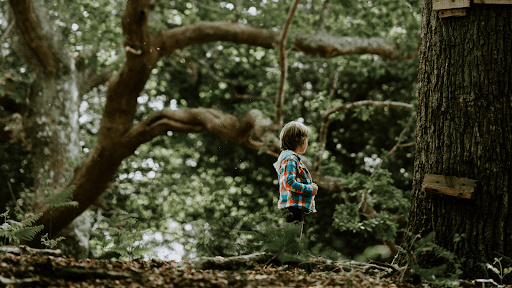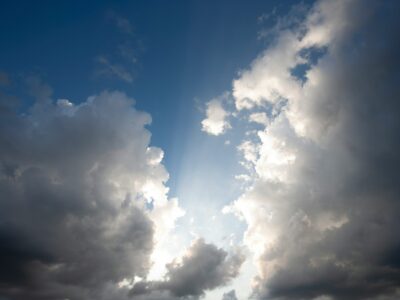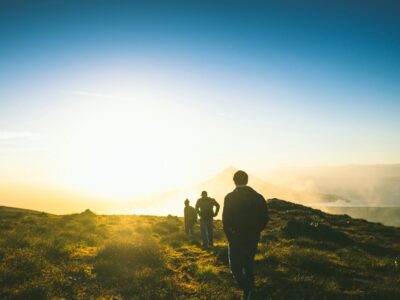This weekend, I attended a virtual conference, called the Creation Care Summit, but before I tell you about it, let me tell you a little about how I arrived there, my own origin story of sorts.
Origin Stories: The Wonders of Creation
My first sanctuary was the forest and fields of my family’s small farm in Northeast Ohio. I didn’t have the vocabulary to call it that then, but the woods were my cathedral, the stream my baptismal font. Ever since time began, Paul tells us in Romans, God has been revealing himself in creation—his eternal power and divine nature. Before I went to church buildings regularly, I went to the church of the woods. Before I read the Bible, I read the mysteries of the forest floor, the canopies of the trees, the patchwork quilt of fallen leaves. In those spaces, I felt wonder as I witnessed the interconnectedness of the natural world.
Origin Stories: The Tension between Science and Religion
This wonder grew in high school biology and chemistry classes, where the more I knew, the more in awe I became. Around this same time, however, I began to explore Christianity, to attend church on Sundays, and to read the Bible. In some church circles, I learned there was a yawning chasm between what Christians believed about the origins of the world and what I had learned in science classes. Science and religion, it seemed, weren’t just in separate categories; they were foes. Trust God instead, trust only God. I had to choose (or at least I thought I had to choose), between the two, “choose for yourselves this day whom you will serve,” I heard (Joshua 24:15).
This for me became a decade-long stumbling block as I engaged in the tension between creation and evolution. There were few people I knew who held substantial faith in God and revered the Bible as his Word, and who had reconciled that same faith with modern science, particularly but not exclusively with our origin story.
When It Comes to Creation, Peace Prevails
That is, until I attended a speaker’s presentation on the campus of a university in my town. Karl Giberson, author of Saving Darwin, shared about his experience being both a Christian and a physicist, and I felt a massive and overwhelming rush of relief. You can love God and love the sciences! It’s allowed! There are actually scientists who follow Christ, who revere the Bible, and who are actively conducting scientific research in the world, right now!
Giberson’s talk and writing set my wild heart free to learn more about our mysterious and complex planet as a mode of worship. After all, to study the work of any creator is to express love and admiration for the creator’s skill, methods, and workmanship; how much more so the Creator of the Universe?
Creation Care: A Home for Lovers of Creation and Lovers of God
If you are like me, someone who loves God and loves people and also loves the earth, and just can’t get enough of nature, and loves to learn the hows and why and whats of creation, then perhaps you’ll feel the same degree of relief and joy I felt when I stumbled upon the Creation Care Summit this past weekend.
Hosted by the BioLogos Foundation, a Christian organization founded by Dr. Francis Collins—the current director of the NIH (National Institutes of Health)—the Creation Care Summit brought together biblical theologians and practicing environmental scientists to discuss the responsibility of Christians today regarding climate change, environmental issues, and the overall health of our world, not just as stewards of the natural resources, but as keepers of the earth, gardeners, protectors, and partners in God’s work of making all things new (Revelations 21:5).
I attended three sessions on Saturday. The first, led by Dr. Richard Middleton, addressed God’s Word. What does it mean to be human in a sacred world? Dr. Middleton mined Scripture and presented a “sacramental vision that configures the earthly realm as God’s intended dwelling, which is now desecrated, but destined for transformation into holiness.” The whole of Scripture points to the importance of caring for creation. There is an abundance of Scriptural evidence for God’s love and plan for earth, and it isn’t for us to just leave it.
The second speaker addressed God’s World in his seminar, “Depravity, Injustice, and Restoration in Conservation Science.” Kyle van Houtan provided three eye opening examples from his own research that demonstrate the biblical themes of depravity, injustice, and restoration. Much like the prophets of old, van Houtan’s storytelling is a witness to the misdeeds of the people of God. In light of these stark realities, how shall we now respond? Are we like the people of Nineveh, when confronted by Jonah, humbled and moved to change, or are we like the people of Laodicea, comfortable and apathetic in the face of the ruler of God’s creation?
The third speaker I listened to shared examples of God’s Work, what is being done around the globe to reverse some of the damage that has been done. In his plenary session, “Our Invisible Community,” Milmer Martinez Vergara, from the organization Plant with Purpose, showed how “faith and ecological awareness can propel us to make choices that build community beyond what we can see with our eyes; an approach that can impact post-conflict peace building, biodiversity conservation, and poverty alleviation in rural communities.”
Bottom line: There are ways we can move forward to partner with one another for the restoration of our earth. That is real kingdom work, living and active love for people and the planet, and all of its residents, both human and non-human.
As a lover of science and nature, and as a lover of God, I found the weekend sessions, the community dialogue, and the enthusiasm of the speakers to be invigorating and inspiring. The Bible is book-ended with a good creation: It begins with a work of love, and it ends with the restoration of that work of love. There is much work to do in the in-between, and as followers of Jesus, we are commanded to do the work, to not grow weary of doing good, and to care for and love what God loves, our neighbors on this blue planet.
For me, this summit inspired me to continue celebrating the work of our Creator, to continue finding brilliant and beautiful connections between God’s Word and God’s World, and to continue spurring each other on to good works that conserve energy, reduce waste, and make space for creation to thrive. I hope you will continue to join me on that journey.





 Copyright
2024
Root and Vine
Copyright
2024
Root and Vine